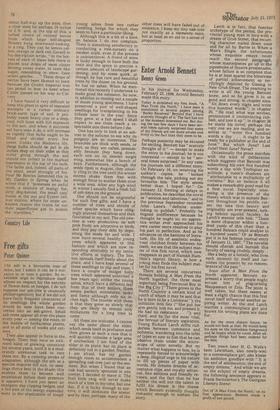Country Life
Free gifts
Peter Quince
he ash is a favourite tree of mine, but I admit it can be a nuisance in or near a garden. Its insatiable urge to reproduce itself allows no respect for the sanctity of flower-beds or hedges. I do not suppose our ash-tree is unusually philoprogenitive; but if we did not have fairly frequent clearances of its seedlings the whole garden would by now have been converted into an ash-grove. Small ash-trees appear all over the place every year — among the roses, in the middle of herbaceous plants, and in all sorts of nooks and corners.
They also appear in force in the. hedges. There they have an awkward habit of growing unnoticed for several years, until it is a moderately strenuous task to root them out. By a cunning stroke of adaptation, although the ash as a species requires full sun, its seedlings thrive best in the shade; this enables them to become well established before their presence is apparent. I have just spent an energetic day clipping hedges, and a fair part of the energy expended went to the eradication of tough young ashes from one rather rambling hedge for which they seem to have a particular liking.
Although this is a bit of a bore, on balance I do not complain.
There is something satisfactory in conducting a tree-nursery on a .modest scale, even if the process is unintentional. A friend of mine is lucky enough to have both the taste and the space to practise a.
certain amount of landscape gar dening; and by some quirk, although he has rare and beautiful trees by the dozen on his ground, he has no ashes. When he mentioned this recently I undertook to make good the omission. So now, in addition to rooting out a couple of dozen young specimens, I have preserved a pair of well-shaped seedlings for transplanting to his hillside later in the year. Since they grow at a fair speed I shall expect to see them reach a respectable size there before 1 die.
One has only to look at an ashtree in the autumn to see why its progeny are so numerous. The branches are thick with seeds, or keys, as they are called, presum ably because they hang down, each one on its slender single wing, somewhat like a bunch of keys. Furthermore, although the seeds ripen in August, they usually cling to the tree until the winter storms shake them free withenough force to scatter them over a wide area. After any high wind in winter I usually find a fresh fall of ash-keys on the ground.
One should not be ungrateful for such free gifts, and I have a number of trees and shrubs of other species which have obligingly planted themselves and then flourished in my soil. The old yew tree is very productive; its soft pink fruits are attractive to birds, and they pay their debt by depo siting the seeds far and wide. I now have several healthy young yews which appeared in this fashion and which are now responding amenably to my tenta tive efforts at topiary. The box, too, spreads itself freely about the place, and I have kept several of these seedlings to clip and train. I have a couple of midget holly trees which appeared uninvited a few years ago; unlike the young ashes, which have a different leaf from that of their seniors, these seems perfect miniatures, spiky and fierce although only six inches high. The trouble with them is that they grow so slowly that they are likely to remain only miniatures for a long time to come.
All these are welcome. I cannot say the same about the elder, which seeds itself in profusion and then grows at such a rate that it will quickly colonise a large area if unchecked. I am fond of the elder in its place, but its place is definitely not in a garden. Neither. I am afraid, has my garden enough room to accommodate a spreading oak-tree just at the moment. But when I found that an oak had secretly sprouted in one corner, I decided to leave it. The frail little twig will never make much of a tree in my time, but one day, if it is lucky enough to survive, it will dominate the scene; and by then, perhaps, many of the other trees will have faded out of existence. I keep my tiny oak-tree not exactly as a memento mori, but at least as an aid to a sense of proportion.






























 Previous page
Previous page